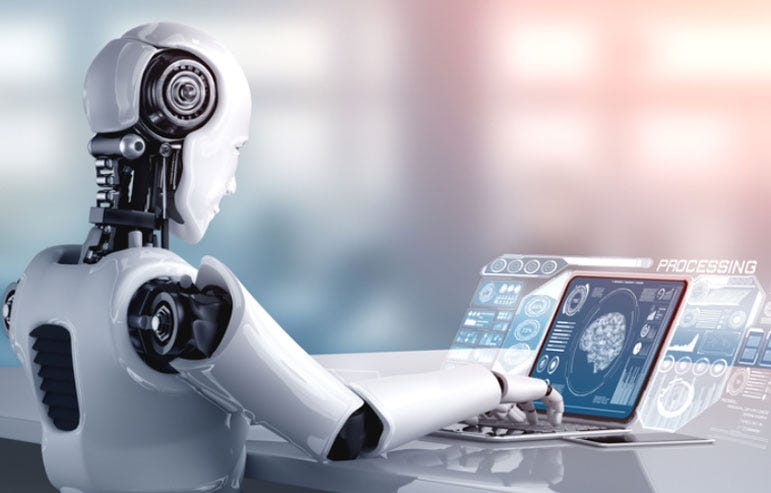Welcome to the future! In a world where science fiction meets reality, artificial intelligence (AI) has taken center stage and is revolutionizing every aspect of our lives. From self-driving cars to virtual assistants, AI is no longer just a concept confined to Hollywood movies; it’s an integral part of our everyday existence. But what exactly is AI? How does it work? And most importantly, how is this groundbreaking technology reshaping the world as we know it? Join us on this captivating journey as we demystify artificial intelligence and explore its incredible impact on society, economy, and even ourselves. Brace yourselves for mind-boggling breakthroughs and prepare to witness firsthand the awe-inspiring possibilities that lie ahead in this new age of intelligent machines.
What is Artificial Intelligence?
Artificial Intelligence (AI) is a computer science field concerned with the design and development of intelligent agents, which are systems that can reason, learn, and act autonomously. It has come to encompass a wide range of technologies from natural language processing to machine learning and robotics. AI research is funded by government agencies, commercial companies, and individual investors.
The History of Artificial Intelligence
The history of artificial intelligence can be traced back to antiquity, when people first started creating simple automatons to do tasks for them. Over the years, AI has evolved into a more sophisticated field, with machines that are able to carry out complex tasks on their own.
Today, AI is revolutionizing our world in ways we could never have imagined. For example, machine learning algorithms can automatically improve the performance of websites and apps without any user input. AI is also being used to create new forms of entertainment, such as video games that are powered by realistic graphics and characters.
In the future, AI will continue to play an important role in our lives. It will help us manage our finances, diagnose diseases, and even drive cars. As we continue to explore its potential, it’s clear that AI has enormous implications for the future of society.
Types of AI
Artificial intelligence is a complex field with many types of AI. This article covers four different types of AI: cognitive, robotic, natural, and machine learning.
Cognitive AI is artificial intelligence that can reason and understand complex concepts. One example of cognitive AI is IBM’s Watson computer system. Watson was able to defeat human champions at the game Jeopardy! by using natural language processing and machine learning.
Robotic AI is artificial intelligence that can be controlled by a human or an algorithm. Robotics research has advanced considerably in recent years, thanks in part to advances in artificial intelligence technology. One example of robotic AI is the DARPA Grand Challenge winner Sebastian Thrun’s robot car Prima Donna.
Natural AI is artificial intelligence that exhibits aspects of cognition and behavior found in biological systems such as humans. Some examples of natural AI are Microsoft’s chatbot Tay and Google’s DeepMind computer system AlphaGo Zero.
Machine learning is a type of artificial intelligence that allows computers to learn from data without being explicitly taught how to do so. Machine learning algorithms are constantly evolving, which means they can learn to perform tasks more accurately over time. An example of machine learning used in business is Netflix’s recommendation engine for predicting what movies you might want to watch next based on your past viewing history
Applications of AI
Artificial intelligence is being used in a variety of ways to improve our lives. Some applications are less well known, but may have just as great an impact on our daily lives. Here are three lesser known AI applications that are making a difference:
1) Autonomous vehicles: Autonomous vehicles use artificial intelligence to make decisions autonomously. This technology has the potential to save lives and reduce traffic congestion.
2) Text-to-speech: text-to-speech software uses artificial intelligence to convert written text into speech. This application is often used for accessibility purposes, such as allowing people with disabilities to read texts aloud.
3) Fraud detection: fraud detection systems use artificial intelligence to identify patterns in data that could signal fraud. These systems can help businesses avoid financial losses caused by fraudulent behavior.
The Future of Artificial Intelligence
Artificial intelligence (AI) is quickly becoming one of the most transformative technologies in history. It’s already been responsible for major advances in many industries, including healthcare, transportation, and logistics. As AI continues to evolve, it has the potential to change virtually every aspect of our lives.
One of the most exciting areas of future development for AI is machine learning. Machine learning is a subset of AI that allows computers to learn from data without being explicitly programmed. This capability makes machine learning powerful tools for solving various problems, including recognizing patterns and figuring out how to operate new systems.
As machine learning becomes more sophisticated, it will be able to learn on its own and improve over time. This could result in machines becoming better at a wide variety of tasks, including navigation, natural language processing, and even driving cars.
Since machine learning relies on large amounts of data, it could also play an important role in shaping the future of artificial intelligence. By streamlining data collection and analysis processes, machine learning could lead to significant improvements in AI accuracy and speed.

